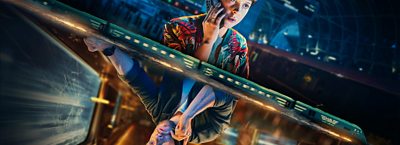Nightsleeper is a real-time thriller for ����ý iPlayer and ����ý One. Created by BAFTA-winning writer Nick Leather, it is a six-part series in which a train is ‘hackjacked’ and driven through one single night from Glasgow to London on an uncertain journey. Part fast-moving heart-in- mouth action-adventure and part twisty-turny whodunnit detective story, it’s a roller coaster drama where no-one is ever quite who they seem. Find out more from Nick Leather in this interview.
All episodes of Nightsleeper will arrive on ����ý iPlayer at 6am on Sunday 15 September. Episodes will air on ����ý One every Sunday and Monday from 9pm that night.
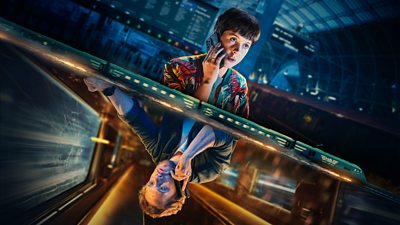
Could you introduce us to Nightsleeper
Nightsleeper is about the attemped hacking of a train, the Glasgow to London sleeper train, and a government agency’s attempt to intervene in that hacking.
The overall question is whether two people who have never met, one on the train and one not, can establish enough of a bond and work together to save the lives of the passengers on board and stop the train before it reaches what might quite literally be its final destination.
Why did you want to write this story?
I wanted to come up with something that was big and potentially buzzy, fun and fast, full of swerves and stunts (I’d never really done anything with stunts before). So, I had that thought in my head, but I didn’t have a story. That was the only thing that I was lacking, apart from that I was almost there! So, I started by asking a series of ‘What if?’ questions to come up with something quite high-concept.
I wanted it to be an idea that would put ordinary people into an extraordinary situation. The idea that I got to was “What if you were sat on the train one day and the doors closed, and it moved off without the driver? And it was potentially being driven by someone from their bedroom or from another country and you were at their mercy.”
The thing I liked about that idea was that we all ‘get’ trains, we all understand the language of trains, so I thought everyone would be drawn in by that idea as a starting point. But that initial question created lots of other questions: Why would someone do that? Who would do it? How would they do it? Who would be in charge of stopping it? How would they stop it? And then what would the person behind it do to try and overcome that? Once one question leads to another then you think “I’m getting more and more story here and I’ve not even started writing”.
There’s also something about trains in particular that I thought would have the tone that I wanted. As I said at the beginning one of the words that I was aiming for was ‘fun’. There is something about trains where I would be able to get a bit of humour into the story as well. ‘See it, Say it, Sorted’ - that’s going to be in there. We’re going to use all these things that we’re used to but change them. That was how I started. And we even tracked down the original people who voiced those announcements and used them in the show.

How plausible is it as an idea? What research did you have to do to find out?
I hoped that it would not be plausible. I hoped that I would be told that this could not be done. I have a friend who is an ethical hacker (Hacky Tom!) and I spoke to Hacky Tom as soon as I had the idea and he sent me this article in which someone, a few years ago, went on a social media forum and claimed to have taken over control of an aeroplane from their seat at the back of the plane by hacking into the online entertainment system. They said that they flew their plane for five minutes until they got scared. Of course the plane company said that this could never happen. When he sent me that article I thought "I love this". Not in terms of travel! But in terms of story.
So we got Hacky Tom into a room with ‘Trains Gareth’ () and ‘Cyber Andrew’. Cyber Andrew used to be a government cyber-security and infrastructure guru. Trains Gareth designs networks. We put them together and asked "Could you do this? Come up with obstacles and try and solve them". After an hour they said "We could do it now, the three of us, between us". I was made up, but also went home on the train thinking "I’m not enjoying this journey any more!"
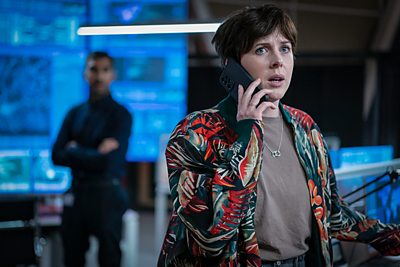
What does being on a train, and a sleeper train specifically, bring to the story?
I think the great thing about a train – and a sleeper train specifically – is the cross-section of people. Often when you write a drama it’s going to be about a certain kind of group. If you put it in a world then it will be about the people from that world. A train as a precinct brings together different people.
When I went on the sleeper train for research, I realised that there’s standard seated at one end and there’s a club lounge in the middle, and the people from standard seated are not allowed to enter the club lounge because the people in the club lounge have got the cabins. I loved that for generating story because I thought that if something goes wrong on that train then we’ll mess up our class divisions and we’ll force people together. Particularly now, that we’re in our social media filter bubbles, I loved the idea of a story that forced people together who wouldn’t normally be together. If I contrived something which also disconnected most of the people from the outside world – we took their phone signals away – then it would force them to connect in real life in ways that they wouldn’t normally. I was very interested in the unexpected combinations of people. Who would get on and who wouldn’t get on?
I was on a train myself once from Newton-le-Willows to Manchester and it broke down. It was about four hours on the line and we were out of phone coverage which was a big factor in people having a bit of a meltdown. There was one guy who was funny at the beginning and after three hours he became a little bit unstable and aggressive. Other people, who initially seemed quiet and wouldn’t speak to anyone, took on a calming and leadership role. I was fascinated by the way that people changed over time. I thought I could really do something with that in this story.
As well as adding some humour I wanted Nightsleeper to have heart and humanity so it’s not about characters who are only there to facilitate the story, but it’s also about people who we care about and who we would invest in as an audience. I wanted each of the passengers to almost be able to stand alone, so you could have a whole episode with them or they could have a whole series to themselves and they would stand up to that.
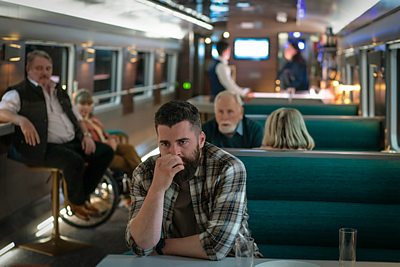
A sleeper train is the most visually interesting type of train. I started off by sketching out the train and then we had a great designer who created a design which I have on my wall and I worked out my story based on the train.
We already know the problem with the locomotive at the front and the lack of driver – so that’s sorted. And then we’ve got the standard seated carriage with a couple of characters in it who for whatever reason couldn’t spend as much money. I’ve got an idea of who they might be. And then through in the Club Lounge I’ve got my guy who is drinking too much. And then through in the cabins I’m thinking about who would be in those cabins and why have they not gone for a drink in the lounge? Someone has chosen to stay in their cabin and who is that person? Going all the way back to the luggage area at the back I almost wanted every door in the train to have a story behind it. Every door that you opened would help me storywise. Maybe we wouldn’t see behind that door in the first episode, but I’ve got that in my back pocket. Sometimes there won’t be a person behind the door but perhaps an object. That generates lots of story and surprises.
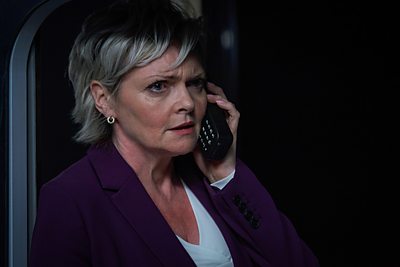
What are some of the key themes that you wanted to explore in Nightsleeper?
It’s a cyber-thriller that’s about disconnecting people from the cyber world and whether they can connect in real life. We’re so bad at even making eye contact these days and I loved the idea of using a cyber-thriller to almost do the opposite and make people try and forge real connections and through that they would change. In the first couple of episodes, we introduce people in a more archetypal way. You’ve got the journalist, the politician, the drunk, but as it goes on you start to get to know them more and more. It’s an interesting thing about characterisation – there’s how a person presents themselves to the world and then there’s how they really are. Once we’ve turned at the end of part three of the drama and move into the second half of the show we’re really digging into them more and finding out whose these people really are.
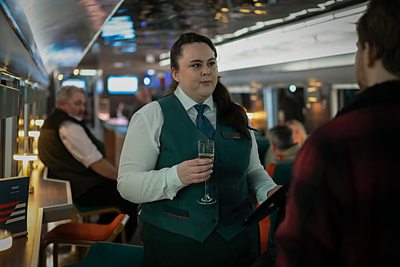
What was exciting and challenging about setting the show in real time? Did you have any inspiration for that?
Well I love . We can’t do 24 but we can do 6! As a starting point I thought that if I’m doing something in real time then I love the idea of it being a journey. Then there’s a very specific reason for it being six hours long. If I can do a six-hour journey and we can potentially go from Glasgow to London – or wherever the train may end up – then there will be something very satisfying about actually doing that journey with them. There are effectively only two sleeper trains in the country which could give you the six-hour journey time which works for the length of a TV series.
Once I’d decided this, I thought I’d go back and watch 24 to pick up some tips and (I’d totally forgotten this) but they have advert breaks! So gets in a car and then after the ad break he arrives at the office. I thought “Oh no what a cheat. I haven’t got this in a ����ý hour!” So if my lead actor () has to get to the back of the train it’s going to take four scenes and we’re going to run it all through. When I did my first draft I got to the end of scene one and wrote ‘Cut to’ and I thought "Cut to what? I’ve got nothing to cut to". And then I had to work out how to do it and how to keep the energy up. Once you’re a couple of drafts in then you’re really into that frame of mind. When I’d finished and went on to write my next script I found it hard to cut out time!
The real time aspect also throws up some interesting challenges – like at the end of an episode you want to have reached a certain point but it would take another fifteen minutes to get to that station even I make the train go really quickly!
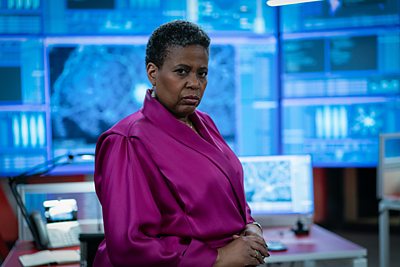
What were some of the challenges of using a train as your setting?
When we started to build the set, I didn’t know how they were going to film it. I don’t worry about such things; I just keep typing away! They built a half train – three carriages – and then it’s redressed and doubled, flipped around to look like the other three. I’d assumed that there would be a green screen so when they’re acting there would be a lot of pretending as the actors wouldn’t see anything outside the windows. What we actually got was much more exciting as they brought in volume walls, which show the world whipping past in real-time as they’re filming. Not just any night scene, but we filmed the whole journey, so what’s going past outside the train windows is what would really be going past outside and it speeds up and slows down with the train. It was so realistic that at the end of the first day I found out that the actors got travel sick! From then on they had to take a travel sickness pill at the beginning of the day.

What do you think audiences will like about the ‘locked box’ real time drama?
There is a heightened intensity to it because you can’t leave. When the characters are trying to get help, they call someone and the person’s phone is switched off. It’s a nightmare. In a normal drama there’s not a great tension in that. In real time there’s enormous drama because if you believe that your train is going to crash in the next five minutes that has a power that is only created by the real-time nature. I think we love that because we in reality we don’t get to experience life by cutting out bits of time. This is how we experience things, it’s the closest drama to our real experience.
Do you think the show will pass the scrutiny of railway enthusiasts? Have you put in any nuggets for them?
I was so keen that it would! I know people love trains – and that includes me. My Grandad built trains. I’m from a train town, Newton-le-Willows, which was on the line of the I even proposed to my wife at a train station. I could do my whole life in trains. But I was quite ignorant of how a locomotive worked and how the rail network works. When I first started this show I really needed to learn a lot. I wanted people who are very keen on trains to watch it and be delighted because there are little nods to them and things that other people won’t be interested in. Trains Gareth, our expert, was so good for that.
We create a specific locomotive for this train. We created our Class 94 bi-modal engine with diesel back-up. We created our Mark 16 carriages. I really enjoyed doing that and thinking about the network itself and how it worked. Going back to those ‘What if’ questions that initially created so much story we looked at the network and my question was "What if the entire UK rail network could effectively become a model railway in someone’s attic?". Sometimes we can do a story and stick to the mainline or there’s another story where we come off the mainline and take the track less travelled, and that fascinated me – if we have the power to go anywhere.
I had a map of the UK rail network on my wall for two years. If ever you’re stuck at a station ring me and I’ll sort you out!
-
Watch Nightsleeper from Sunday 15th September 2024 On ����ý One and ����ý iPlayer
